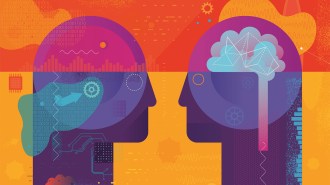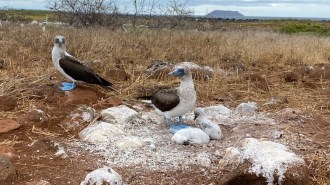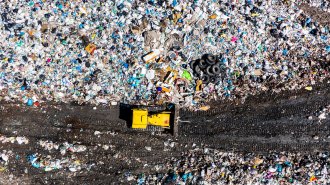Column
-

Finally, scientists are making progress on long COVID
Editor in chief Nancy Shute discusses researchers' efforts to uncover long COVID's mysteries.
By Nancy Shute -

How patient-led research is advancing science
Editor in chief Nancy Shute considers the role that people suffering from a variety of chronic conditions are starting to play in medical research.
By Nancy Shute -

Here comes the sun, the eclipsed version
Editor in Chief Nancy Shute muses on the total solar eclipse that will cross North America in April 2024.
By Nancy Shute -
 Artificial Intelligence
Artificial IntelligenceWhy large language models aren’t headed toward humanlike understanding
Unlike people, today's generative AI isn’t good at learning concepts that it can apply to new situations.
-

Come along with us on a mathematical mystery tour
Editor in chief Nancy Shute discusses an unexpected breakthrough on a puzzle that has intrigued mathematicians for almost a century.
By Nancy Shute -

Using public health research to save lives
Editor in chief Nancy Shute discusses how overdose prevention centers, where people can use drugs in a supervised setting, are saving lives.
By Nancy Shute -
 Humans
HumansHere’s why COVID-19 isn’t seasonal so far
Human immunity and behavior may be more important than weather for driving seasonality when it comes to COVID-19.
-
 Animals
AnimalsA bird flu outbreak is sweeping the globe. Its long-term effects are unclear
A reporter’s recent trip to the Galápagos offered a chance to reflect on the bird flu outbreak, which has killed millions of birds and other animals.
-

What a parrot knows, and what a chatbot doesn’t
Editor in chief Nancy Shute discusses AI chatbots' vulnerabilities and the intelligence of parrots.
By Nancy Shute -

Bringing scientists’ stories out of the shadows
Editor in chief Nancy Shute spotlights scientist Emma Rotor's contributions to weapons research in World War II.
By Nancy Shute -
 Climate
ClimateCOP28 is making headlines. Here’s why the focus on methane matters
Here’s one takeaway from COP28: Deep cuts to methane are essential to meet the Paris Agreement goals. That’s still possible.
-

Under the jungle, a more pluralistic Maya society
Editor in chief Nancy Shute discusses how new scientific discoveries are rewriting the history of Maya society
By Nancy Shute